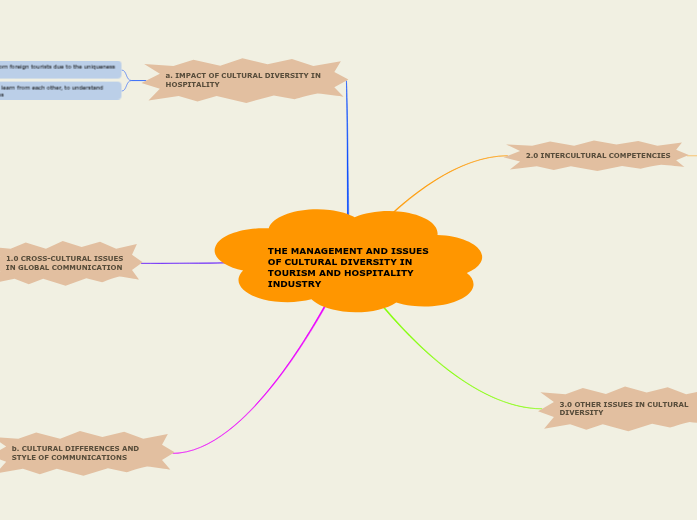THE MANAGEMENT AND ISSUES OF CULTURAL DIVERSITY IN TOURISM AND HOSPITALITY INDUSTRY
2.0 INTERCULTURAL COMPETENCIES
a set of cognitive, effective and behavioral skills that support
interactive and appropriate effectiveness in a variety of cultural contexts
How to develop intercultural competence
Be grateful
Immerse yourself
Have challenging conversation
Process orientation
Knowledge and comprehension
Internal outcome
External outcome
Attitude
a. IMPACT OF CULTURAL DIVERSITY IN HOSPITALITY
increase customer from foreign tourists due to the uniqueness of various nations.
It help employees to learn from each other, to understand each other differences
3.0 OTHER ISSUES IN CULTURAL DIVERSITY
CULTURAL
CULTURE IS THE SHARED KNOWLEDGE ,BEHAVIORAL NORMS, VALUE AND BELIEFS THAT HELP PEOPLE TO LIVE IN FAMILIES,GROUPS AND COMMUNITIES.
RELIGION
RELIGION AND INTEGRAL PART OF CULTURE,CAN BECOME AN ISSUES IN THE WORKPLACE.FOR EXAMPLE,DIFFERENT RELIGIOUS GROUPS CELEBRATE DIFFERENT HOLIDAYS.
AGE
AGE DISCRIMINATION INVOLVES TREATING SOMEONE ( AN APPLICANT OR EMPLOYEE) LESS FAVORABLY BECAUSE OF HIS OR HER AGE.
PHYSICAL AND MENTAL DISABILITIES AND LIMITATIONS
DISABILITY DISCRIMINATION OCCURS WHEN AN EMPLOYER TREATS A QUALIFIED INDIVIDUAL WITH A DISABILITY WHO IS AN EMPLOYEE OR APPLICANT UNFAVORABLY BECAUSE SHE HAS DISABILITY.
1.0 CROSS-CULTURAL ISSUES IN GLOBAL COMMUNICATION
LANGUAGE
When someone does business, they have to speak the same language.
Even though they are not from the same place, they need to know and
have the diligence to speak with proper verbs in order to avoid
misunderstanding while speaking.
WORKPLACE
More and more managers are seeing problems within their own workplace because
of a lack of understanding of other cultures. It simply involves two people of a different ethnic
background who do not understand the other culture well enough to effectively communicate with each other.
b. CULTURAL DIFFERENCES AND STYLE OF COMMUNICATIONS
VERBAL
Verbal communication is one way for the people to communicate face-to-face. Verbal communication is generally thought as spoken language. We express ourselves through words.
Direct
Face to face
Spechees
Television
Radio
Telephone conversation
Indirect
Emails
Books
Newspaper
Magazine
Latters
NON-VERBAL
Non-verbal communication that occurs without words which is continuous. It is body language and environmental context involved in any communication. It is not what is said with words but how it is said and expressed.
Type of non-verbal
Eye-Contact
Hand Movement
Facial Expression
Touch
Gesture
